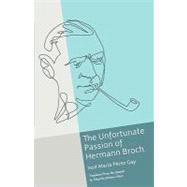- ISBN: 9780979645730 | 0979645735
- Cover: Paperback
- Copyright: 4/30/2008
Having earned its author, Joés María Pérez Gay, the Austrian Cross of Honor for Arts and Sciences (first class), this acclaimed, concise biography focuses on novelist Hermann Broch's preoccupation with his Austrian-Jewish heritage and examines his obsession with human morality, social and moral decadence and mass psychology, specifically, in relation to the tragic historical events of the first half of the twentieth century. In contrast to Franz Kafka's worldwide fame, the effect that Broch (and his colleague Robert Musil) had on the literary world outside Central Europe has remained, until quite recently, rather unappreciated. At the root of his profound literary achievement is his analytical clairvoyance concerning the crisis of values that would culminate in the ignominious catastrophes of the Second World War. In his trilogy, The Sleepwalkers, praised by Milan Kundera as "one of the greatest European novels," Broch illustrates the decay of values in German society, combining lyricism, essayism and naturalism in three distinct segments, beginning with the demise of the Prussian aristocracy and shifting to the moral bankruptcy of the bourgeoisie. The nadir is reached in the third volume as a nihilistic Zeitgeist emerges, devoid of any moral or ethical principles. The depth of his political critique and his modernist experimentation with form and content undoubtedly owe much to the influence of James Joyce. In The Death of Virgil, described by Thomas Mann as "one of the most extraordinary and profound experiments ever to have been undertaken with the flexible medium of the novel," Broch depicts the epic Roman poet's transformation of everything tangible into an inner, visionary, dream-like experience, as he faces the last hours of his life. The moribund poet, fatigued by the decadence of Roman civilization, carries on a discussion with Caesar Augustus: wherein the former, disenchanted with the efficacy of literature, calls for his work to be burned while the latter wishes it to be preserved for posterity, for it captures the legacy of the Empire. An analogous quest for the 'holy' within a world of eroding values becomes the subject of another of Broch's outstanding novels, The Guiltless. In the midst of an era characterized by moral decadence, Hermann Broch wrestles with pessimism, though he clings to his belief in the capacity for human transcendence as the ultimate purpose of literary expression. Morally and spiritually speaking, he believes that literature must possess a restorative function. He also suggests that science alone is inadequate when faced with the task of grasping the world's totality. Moreover, he implies that perhaps the novelist is better equipped than the church and clergy to apprehend the metaphysical components of existence-for literature stands as the revelation of a mythic unity of being in the world, while men and women strive to come to terms with their mortality. This book introduces us to the gentle, generous soul of one of Europe's greatest modern novelists, contributing to the recuperation of his legacy for the benefit of all those who embrace the moral dimensions of literature.







